This article was co-authored by Carrie Noriega, MD. Dr. Noriega is a Board Certified Obstetrician & Gynecologist and medical writer in Colorado. She specializes in women’s health, rheumatology, pulmonology, infectious disease, and gastroenterology. She received her MD from the Creighton School of Medicine in Omaha, Nebraska and completed her residency at the University of Missouri - Kansas City in 2005.
There are 9 references cited in this article, which can be found at the bottom of the page.
This article has been viewed 151,094 times.
If you know in advance that your period is going to interfere with special plans like going on vacation or getting married, it may be possible to skip it entirely. We'll explain how you can use birth control pills to delay your period, but be sure to talk to your gynecologist first.
Steps
Choosing a Method
-
1Ask a gynecologist. Taking birth control is the safest and most effective way to skip a period, and you should never begin a birth control regimen without first consulting a licensed physician. Tell your gynecologist that you want to skip your period, and ask him or her to recommend the best method for you.
- Remember: using birth control does not necessarily mean that you are sexually active. There are many reasons that you might want to skip a period!
-
2Plan ahead. Be aware that if you aren't already on a hormonal birth control plan, it may take as long as two to three months for your body to adjust to the new cycle. You may not be able to skip your cycle for those first few months. Start your contraceptive regimen at least three months in advance if you want to be absolutely sure that you'll be able to skip your period.Advertisement
-
3Choose a birth control method. You need a hormonal form of birth control – no implants or injections. A traditional IUD does not release hormones, but one that contains hormones (like Mirena) does. The two standard methods are monophasic birth control pills and the NuvaRing.
- Monophasic pills: The active pills contain the same mix of hormones each week. Monophasic pills are steady and stable, with less spotting than multiphasic pills, making them better-suited to skipping periods. To skip a period: simply start a new packet of pills as soon as you finish the last active pill, and skip the seven-day placebo phase.[1]
- Multiphasic pills: The mix of hormones in the active pills changes from week to week to account for the various phases of your cycle. This variability means that you must take the pills in the right order to effectively protect yourself. Ask your gynecologist about which pills are okay to skip.
- NuvaRing: This is a small, bendable ring that you insert into your vagina for three weeks at a time. Usually, you remove the ring for one week each month – but you can leave the ring in for this extra fourth week in order to skip your period. If you put in a new ring immediately at the end of the four weeks, then you can continue to offset your period.[2]
-
4Arrange to fill your prescription early. Skipping a period with birth control entails continuing to take regular dose of active birth control pills through the usual week-long placebo pill period. In order to do this, you'll need the next month's batch of pills by the end of the third week of your "birth control cycle," Contact your medical insurance provider to make sure that you can refill your prescription at least a week early. If your insurance provider won't authorize an early prescription, ask your gynecologist to prescribe your contraceptives in 90-day batches to ensure that you'll always have enough.
-
5Understand the drawbacks. Birth control pills are convenient, but they must be taken at the same time every day to be truly effective. There is a small risk that the NuvaRing will fall out of your vagina, in which case you must rinse it with sanitary water before re-inserting it.[3] Any kind of hormonal birth control may trigger related hormonal fluctuations that affect other aspects of your health. Remember: you are essentially convincing your body that it is pregnant.
- There are some birth control pills (continuous birth control, or CBC) that are designed for a period once every four months.[4]
- Approximately 20 percent of men whose partners use a vaginal ring say that they can feel the ring during sex. This may be a low risk – but it is something to consider nonetheless. If you decide to use the Nuvaring, keep in mind that you can remove the ring to have sex and then replace it after sex. Nuvaring remains effective as long as it is not out for more than 48 hours.
Using Birth Control Pills
-
1Prepare your pills. Confirm that you're using monophasic pills and that you already have the next pack. Make sure that you can discern between the active pills (which suppress your period) and the placebo pills (which trigger a week of withdrawal bleeding). Use a calendar to chart out your birth control schedule for the weeks leading up to the period that you want to skip.
- Monophasic pills cause less spotting than multiphasic pills, making them better suited to skipping periods.[5] However, you can still skip a period using multiphasic pills. Ask your gynecologist about which pills you can skip in order to miss your period.[6]
- If you aren't already on a birth control program, speak to your gynecologist about starting. Only take birth control pills that you've been prescribed by a licensed physician.
-
2Take the pill as prescribed for three weeks. If you are taking monophasic pills, then you just need to take the same pill every day. If you are using multiphasic pills, then you'll need to be careful to keep to the schedule. If you aren't sure, ask your gynecologist for advice on how to proceed.
- If your birth control is packaged with a "period week" of placebo pills, feel free to discard the placebos. They are sugar pills, and you won't need them if you are going to skip your "period."
-
3Start a new pack of active pills. Skip the placebo pills. Begin the next month's birth control packet immediately at the end of the regular three-week regimen. Make sure that you are ready with the new pills as the three-week mark approaches![7]
- Remember: if you're taking birth control, you are not actually getting your period on the fourth "placebo" week of the month. The bleeding that occurs is "withdrawal bleeding" as your body responds to stopping the hormones.[8] Withdrawal bleeding does not pose a serious risk to your health and skipping withdrawal bleeding does not affect your health. It is safe to skip your period indefinitely using hormonal birth control.
- You may experience minimal spotting. However, this should not last more than a day. Monophasic pills are more stable than multiphasic pills, and thus less likely to trigger spotting.
-
4Stop taking the pills to have a period again. If you've been taking the pills for three or more weeks, you can pause to take a period whenever it's convenient. Simply stop taking your active birth control pills for four days. Then, start taking the active pills again.[9]
- Consider taking up to a week's break from your contraceptive after any skipped withdrawal period. It's good to give your body a rest.
Using the NuvaRing
-
1Make sure that you have the next month's NuvaRing. For regular use, you would leave the NuvaRing in for three weeks, then remove it for one week before inserting the new ring. If you are using your ring to skip a period, you can leave it in for up to four weeks before starting a new ring.[10]
-
2Keep your ring in for four weeks, then immediately replace it. At the end of the four weeks, remove the NuvaRing and replace it with a fresh ring. This will re-dose your body with hormones, effectively skipping your period.[11]
- The regular ring cycle ends after three weeks. You may leave it in for the fourth week, or you can remove it and replace it immediately with a fresh ring.
-
3Leave the ring out to have a period again. If you've been using a NuvaRing for three or more weeks, simply remove it for four days to get your period again. After four days, put in a new ring to resume your cycle.
Expert Q&A
-
QuestionHow do I get my periods to resume?
 Carrie Noriega, MDDr. Noriega is a Board Certified Obstetrician & Gynecologist and medical writer in Colorado. She specializes in women’s health, rheumatology, pulmonology, infectious disease, and gastroenterology. She received her MD from the Creighton School of Medicine in Omaha, Nebraska and completed her residency at the University of Missouri - Kansas City in 2005.
Carrie Noriega, MDDr. Noriega is a Board Certified Obstetrician & Gynecologist and medical writer in Colorado. She specializes in women’s health, rheumatology, pulmonology, infectious disease, and gastroenterology. She received her MD from the Creighton School of Medicine in Omaha, Nebraska and completed her residency at the University of Missouri - Kansas City in 2005.
Board Certified Obstetrician & Gynecologist Your periods should resume within a few days of stopping your hormonal contraception. However, sometimes if you have been using hormones for a long time, the lining of your uterus may have become so thin that you won't actually get a period before you restart your hormones at the end of your week off. If you have been completely off of your hormones for 3 months and have not restarted your period then you should make an appointment to see your doctor.
Your periods should resume within a few days of stopping your hormonal contraception. However, sometimes if you have been using hormones for a long time, the lining of your uterus may have become so thin that you won't actually get a period before you restart your hormones at the end of your week off. If you have been completely off of your hormones for 3 months and have not restarted your period then you should make an appointment to see your doctor. -
QuestionI started my pills, and l have been bleeding for three weeks. What can I do to stop it?
 Carrie Noriega, MDDr. Noriega is a Board Certified Obstetrician & Gynecologist and medical writer in Colorado. She specializes in women’s health, rheumatology, pulmonology, infectious disease, and gastroenterology. She received her MD from the Creighton School of Medicine in Omaha, Nebraska and completed her residency at the University of Missouri - Kansas City in 2005.
Carrie Noriega, MDDr. Noriega is a Board Certified Obstetrician & Gynecologist and medical writer in Colorado. She specializes in women’s health, rheumatology, pulmonology, infectious disease, and gastroenterology. She received her MD from the Creighton School of Medicine in Omaha, Nebraska and completed her residency at the University of Missouri - Kansas City in 2005.
Board Certified Obstetrician & Gynecologist When first starting your pills it may take up to three months before your body gets into a regular cycle again. You should make sure that you are taking your pills at the same time every day and are not skipping any pills. If after three months you have not stopped bleeding, then you should make an appointment to discuss this with your doctor.
When first starting your pills it may take up to three months before your body gets into a regular cycle again. You should make sure that you are taking your pills at the same time every day and are not skipping any pills. If after three months you have not stopped bleeding, then you should make an appointment to discuss this with your doctor.
Warnings
- Never use anyone else's prescription medication.⧼thumbs_response⧽
- Many forms of hormonal contraceptives are hindered when they are used while you're on antibiotics.⧼thumbs_response⧽
- All hormonal contraception is associated with a risk of blood clots. Some studies have shown that patches may not increase the risk of clots at all, or they may double the risk.⧼thumbs_response⧽
- It can take two to three months for your body to adjust to its new cycle. You may not be successful with skipping your period during the first few months of beginning a hormone-based contraceptive regimen.⧼thumbs_response⧽
Things You'll Need
- Hormone-based contraceptive in pill, ring or patch form
- Time: 2-3 months of a hormonal contraceptive regimen
References
- ↑ https://www.nhs.uk/common-health-questions/travel-health/how-can-i-delay-my-period/
- ↑ http://bedsider.org/methods/the_ring#details_tab
- ↑ https://www.plannedparenthood.org/learn/birth-control/birth-control-vaginal-ring-nuvaring/how-do-i-use-nuvaring
- ↑ http://www.pamf.org/teen/sex/birthcontrol/seasonale.html
- ↑ http://bedsider.org/features/290-a-quick-guide-to-skipping-periods-with-birth-control
- ↑ http://www.nhs.uk/chq/Pages/830.aspx?CategoryID=60&
- ↑ http://bedsider.org/features/290-a-quick-guide-to-skipping-periods-with-birth-control
- ↑ https://www.naturalcycles.com/cyclematters/what-is-withdrawal-bleeding
- ↑ https://www.nhs.uk/conditions/contraception/when-periods-after-stopping-pill/
About This Article
If you want to skip your period, all you need to do is start your new month on your 4th week. If you’re on monophasic pills, just skip your placebo pills and move straight onto your new packet. Contact your doctor or medical insurance provider to make sure you can refill your prescription a week early so you don’t run out. After you skip your period, you can take a 4-day break from your pill’s whenever it’s convenient to balance your hormones. If you’re using NuvaRing, just leave it in for your 4th week, then start your new ring right after to redose your hormones. Keep in mind, if you only started taking contraceptives in the last 3 months, there’s a chance skipping won’t work and you’ll still get your period. For more tips from our Medical co-author, including how to have only 4 periods a year, read on.
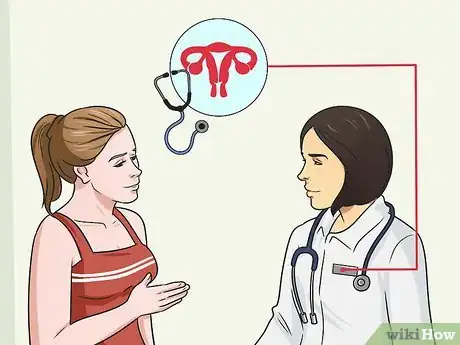
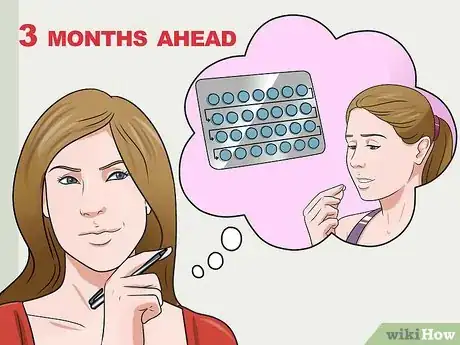
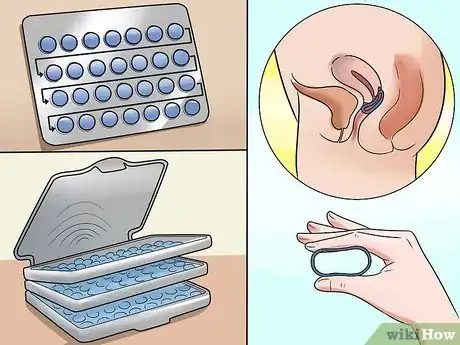
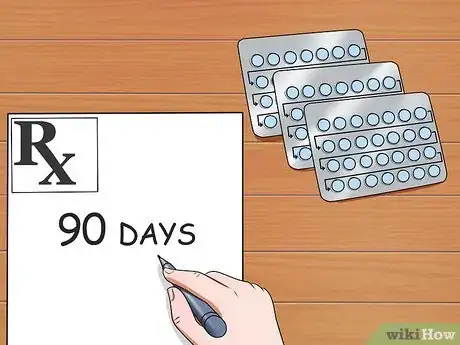
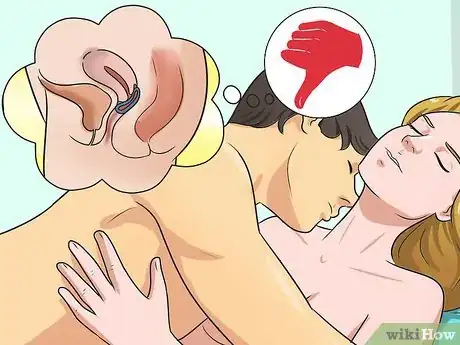
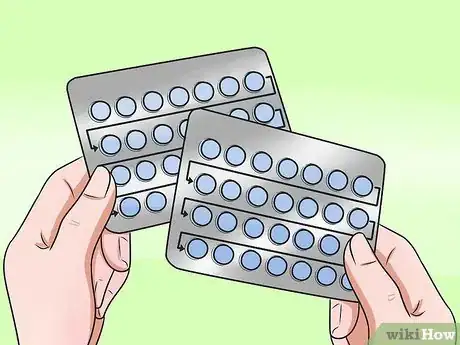
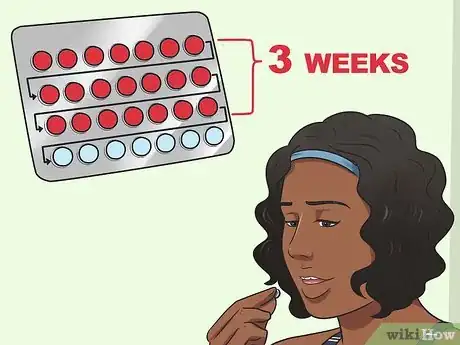
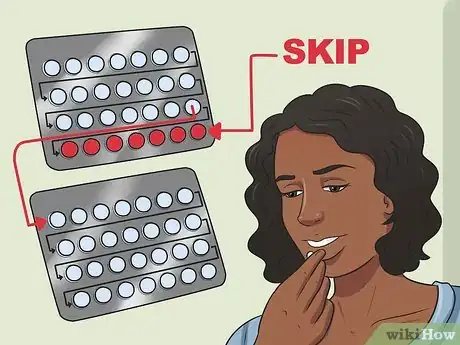
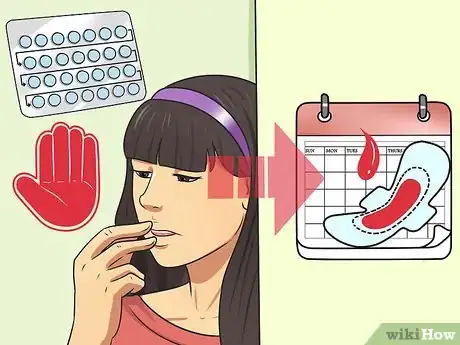
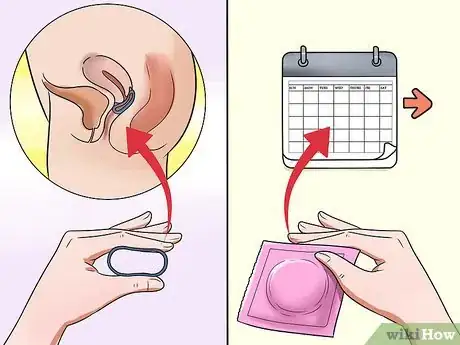
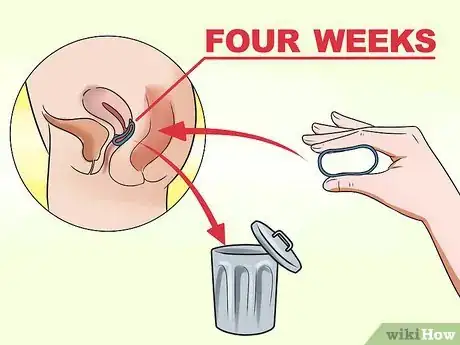
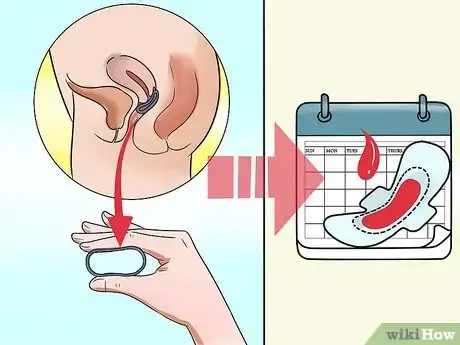

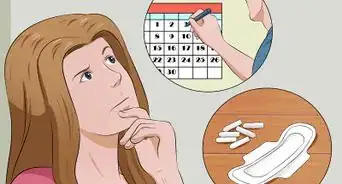

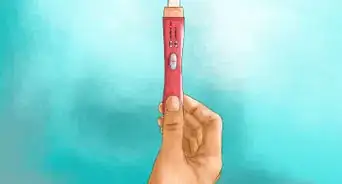
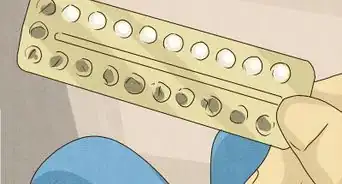



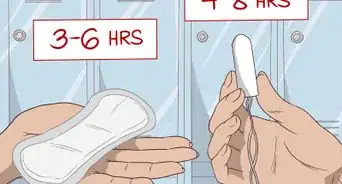













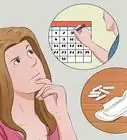
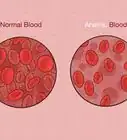




































Medical Disclaimer
The content of this article is not intended to be a substitute for professional medical advice, examination, diagnosis, or treatment. You should always contact your doctor or other qualified healthcare professional before starting, changing, or stopping any kind of health treatment.
Read More...